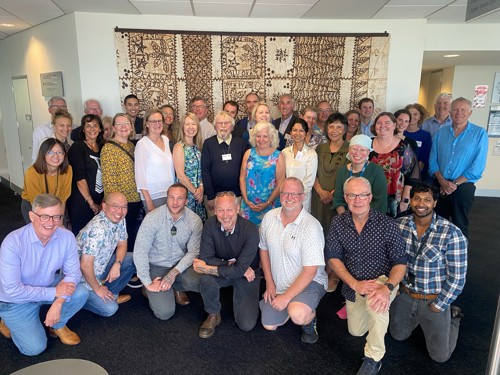High praise for MWC research from eminent scientists
Following a meeting in Auckland in February 2024, the Maurice Wilkins Centre Scientific Advisory Board, comprised of highly respected international scientists and science entrepreneurs, praised the Centre for its vision in creating a taonga within Aotearoa New Zealand’s scientific research ecosystem.

At this meeting the Scientific Advisory Board (SAB) reviewed the progress of major MWC research programmes and advised on future research directions as well as wider MWC strategy.
As a result of the COVID pandemic, five years lapsed since the last review and report from the SAB. Now, mid-term in the current funding cycle, MWC has had significant changes in structure, leadership and emphasis. Composition of the SAB has also seen change while maintaining around fifty percent continuity to preserve an overlap and corporate memory.
In 2024, MWC welcomed back Dr Warwick Tong who took on the role of SAB Chair. Dr Tong has had a career spanning more than 30 years in the pharmaceutical and biotechnology sectors including CEO of Cancer Therapeutics CRC in Melbourne from 2011 to 2018. His strong focus on translational development and commercialization has led teams through major partnering deals, advanced clinical trials and subsequent FDA approval.
Joining Dr Tong were four of our esteemed advisory board members from past meetings: Prof David James (University of Sydney, Australia); and Dr Jeanette Wood (Wood Pharma Consulting Services, Switzerland); Professor Mark Walker (The University of Queensland, Australia) and Dr Giles Yeo (University of Cambridge, UK).
This year, we were also honoured to have three more international experts join our SAB: new members were Prof Jenny Martin (University of Wollongong) and Dist. Prof Gail Risbridger (Monash University, also University of Melbourne), and Prof Alex Brown (University of Adelaide) in absentia.
Following two days of meetings reviewing documentation and presentations by MWC investigators, the SAB reported its findings. Their report was very positive in relation to the centre’s research performance and value to New Zealand.
“Despite many challenges, MWC continues to address its mission to conduct world-leading biomedical research to have an impact on the health and wealth of New Zealanders in areas of cancer, infectious disease and metabolic disease,” they wrote.
They commended MWC’s growth in developing “a New Zealand-wide network of scientists and clinicians” — a success facilitated by an Otago-based directorship under Prof Greg Cook who took on the role since the last SAB meeting. The SAB thanked Prof Cook for his contributions and met with Prof Grattan, the new MWC Director saying they were “highly impressed by his vision and oversight of what is a complex structure.”
For continuing members of the SAB, one of the most impressive changes was the integration of the Māori engagement strategy across and throughout the MWC, noting that it provides a very successful template to build on.
“The recent implementation of the Māori engagement strategy ensures that the work of MWC is doubly focused on areas of high need and populations that are most likely to benefit,” the SAB wrote.
Their recommendations helped shape the 2025-2028 MWC plan with the value of an external review being noted by the TEC in its subsequent consideration of the plan.